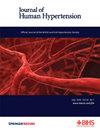Differences in ambulatory versus home blood pressure levels by ethnicity: data from the United Kingdom and Japan
IF 2.7
4区 医学
Q2 PERIPHERAL VASCULAR DISEASE
引用次数: 0
Abstract
This study tested the hypothesis that differences in ethnicity impact the level of agreement between ambulatory blood pressure (ABP) and home BP (HBP) levels. A retrospective analysis of cross-sectional data from the UK and Japan was performed. Participants underwent office BP, daytime ABP, and HBP measurements. The ABP–HBP difference was compared between ethnic groups by multiple linear regression analysis. Diagnostic disagreement was defined as a disparity between the hypertension diagnoses obtained using ABP and HBP, since both measures share common thresholds of 135/85 mmHg for hypertension. Definite diagnostic disagreement was assigned where such a difference exceeded ±5 mmHg for either systolic BP (SBP) or diastolic BP (DBP). A total of 1 408 participants (age 62.1 ± 11.1 years, 48.6% males, 78.9% known hypertensive, White British 18.9%, South Asian 11.2%, African Caribbean 12.0%, Japanese 58.0%) were eligible. More Japanese participants showed higher ABP than HBP compared to White British: SBP + 3.09 mmHg, 95% confidence interval (CI) + 1.14, +5.04 mmHg; DBP + 5.67 mmHg, 95%CI + 4.51, +6.84 mmHg. More Japanese participants than African Caribbean participants exhibited diagnostic disagreement in SBP (33.2% vs. 20.7%, p = 0.006). Furthermore, Japanese participants had a higher percentage of definite diagnostic disagreement in SBP compared to White British (9.3% vs. 4.5%, p = 0.040) and African Caribbean participants (9.3% vs. 3.0%, p = 0.018). In conclusion, Japanese participants showed greater disparity between ABP and HBP compared to White British participants. Complementary use of ABP and HBP monitoring may be more beneficial for assessing cardiovascular disease risk in Japanese participants compared to other ethnic groups.

按种族划分的门诊血压与居家血压的差异:来自英国和日本的数据。
本研究对种族差异会影响门诊血压 (ABP) 和居家血压 (HBP) 水平之间一致性的假设进行了检验。研究对英国和日本的横断面数据进行了回顾性分析。参与者接受了诊室血压、日间 ABP 和 HBP 测量。通过多元线性回归分析比较了不同种族群体之间 ABP-HBP 的差异。诊断分歧被定义为使用 ABP 和 HBP 得出的高血压诊断结果之间的差异,因为这两种测量方法对高血压的共同阈值都是 135/85 mmHg。如果收缩压(SBP)或舒张压(DBP)的差异超过±5 mmHg,则诊断结果存在明显差异。共有 1 408 名参与者符合条件(年龄为 62.1 ± 11.1 岁,48.6% 为男性,78.9% 已知患有高血压,英国白人占 18.9%,南亚人占 11.2%,加勒比海非洲人占 12.0%,日本人占 58.0%)。与英国白人相比,更多日本参与者的 ABP 高于 HBP:SBP+3.09毫米汞柱,95%置信区间(CI)+1.14,+5.04毫米汞柱;DBP+5.67毫米汞柱,95%置信区间(CI)+4.51,+6.84毫米汞柱。在 SBP 诊断上出现分歧的日本参与者多于非裔加勒比海参与者(33.2% 对 20.7%,P = 0.006)。此外,与英裔白人(9.3% 对 4.5%,p = 0.040)和加勒比海非洲裔参与者(9.3% 对 3.0%,p = 0.018)相比,日裔参与者在 SBP 方面有明确诊断分歧的比例更高。总之,与英国白人参试者相比,日本参试者的 ABP 和 HBP 差异更大。与其他种族群体相比,辅助使用 ABP 和 HBP 监测可能更有利于评估日本参与者的心血管疾病风险。
本文章由计算机程序翻译,如有差异,请以英文原文为准。
求助全文
约1分钟内获得全文
求助全文
来源期刊

Journal of Human Hypertension
医学-外周血管病
CiteScore
5.20
自引率
3.70%
发文量
126
审稿时长
6-12 weeks
期刊介绍:
Journal of Human Hypertension is published monthly and is of interest to health care professionals who deal with hypertension (specialists, internists, primary care physicians) and public health workers. We believe that our patients benefit from robust scientific data that are based on well conducted clinical trials. We also believe that basic sciences are the foundations on which we build our knowledge of clinical conditions and their management. Towards this end, although we are primarily a clinical based journal, we also welcome suitable basic sciences studies that promote our understanding of human hypertension.
The journal aims to perform the dual role of increasing knowledge in the field of high blood pressure as well as improving the standard of care of patients. The editors will consider for publication all suitable papers dealing directly or indirectly with clinical aspects of hypertension, including but not limited to epidemiology, pathophysiology, therapeutics and basic sciences involving human subjects or tissues. We also consider papers from all specialties such as ophthalmology, cardiology, nephrology, obstetrics and stroke medicine that deal with the various aspects of hypertension and its complications.
 求助内容:
求助内容: 应助结果提醒方式:
应助结果提醒方式:


